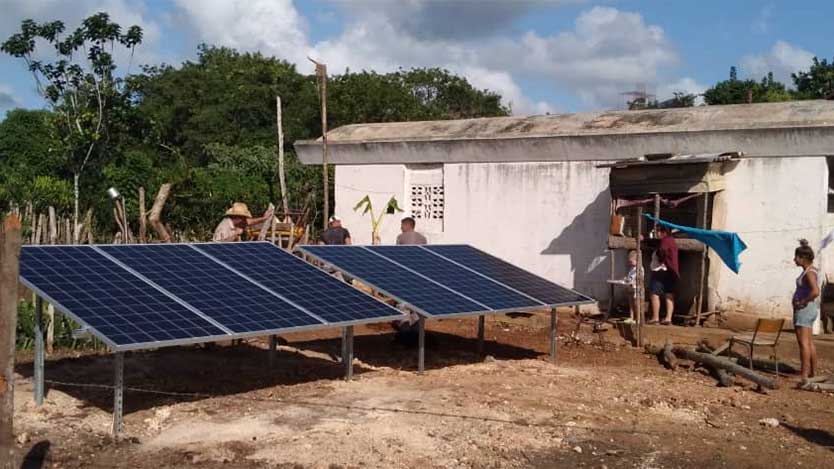
In Ciego de Ávila, a joint project of the Ministry of Energy and Mines, the United Nations Development Program (UNDP) and the European Union is progressing, consisting of the installation of photovoltaic solar systems with two kW of power (2,000 watts) in 167 homes isolated from the electricity grid in the northern part of the province, affected by Hurricane Irma in 2017.
Viviana Martínez Cárdenas, main specialist of the Department of Investments in the Electric Company of Ciego de Ávila, told Invasor that among the advantages of this higher capacity technology is that it allows the connection of electrical appliances such as a refrigerator, a television, a stereo, a cell phone charger, a pressure cooker, another rice cooker, and an electric stove (80 to 100 W).
On the subject, Mario Toledo Carrasco, director of the Base Business Unit for Renewable Energy Sources, explained that such systems, with a useful life of five to eight years, admit inductive loads (devices that work with electric motors). So mixers and washing machines can be used as long as they support the loads of all the equipment connected at that moment.
"To date, 62 of these modules have been installed in the municipalities of Bolivia, Morón and Florencia, we would have those concerning Chambas, which is the largest number, and where we will start from next April," Martínez Cárdenas reported.
<
He added that the assembly is carried out by two brigades from the Copextel Division and one from the Territory's Electric Company, who have the necessary training and equipment to meet the project's requirements, which has been endorsed during the three visits made by the European Union and the UNDP to the province. To date, the schedule has been met and the completion of the total assembly is estimated at the end of April.
With investments of this type, the quality of life of people who live in rural areas far from the National Electric Power System is improved, by bringing benefits such as the change in the cooking of food. It had to be done with charcoal or firewood, the care for the environment by not emitting polluting gases into the atmosphere, as well as avoiding the exodus of these inhabitants to the cities.
The project to increase the energy resilience of communities to extreme weather events based on the use of renewable energy sources (FRE) covers, in addition to Ciego de Ávila, the provinces of Villa Clara, Sancti Spíritus and Camagüey.
The maintenance and start-up of the two kW power kits is offered by the Avilanian Electrical Company, with a service guarantee of a number of spare parts to deal with any of the breakdowns, which, if they occur, customers can report to the information centers, your complaint is collected with the contract number and the solution of the problem is processed, clarified Viviana Martínez Cárdenas.
He also commented that next May the work of the LEMI project would begin in Ciego de Ávila geography, which will last until the end of the year, with Chinese investment, and will allow the electrification of 137 homes in the municipalities of the central and southern areas of the province with photovoltaic solar kits of 500 W of power.
LEMI will benefit those homes located in isolated communities that do not have electric service from any generation source, and some that have electric service through mini-hydroelectric plants that are susceptible to running out of water and energy during droughts.
